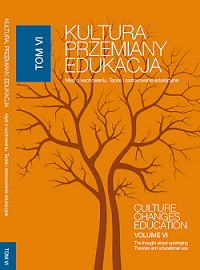W poszukiwaniu determinantów skutecznego wychowania
DOI:
https://doi.org/10.15584/kpe.2018.6.10Słowa kluczowe:
wychowanie, wychowawca, dzieci, autorytet, empatia, podmiotowe traktowanieAbstrakt
Wychowanie stanowi nieodłączny aspekt naszego życia i niezależnie od tego, w jakim stopniu mamy tego świadomość, wszyscy jesteśmy uczestnikami procesu wychowawczego. To, w jaki sposób patrzymy na świat oraz zachowujemy się w określonych sytuacjach i jak się komunikujemy z innymi, wynika z tego, jak zostaliśmy wychowani. Janusz Korczak mocno zaznaczył wagę wychowania, pisząc: „wychowanie dziecka to nie miła zabawa, a zadanie, w które trzeba włożyć wysiłek bezsennych nocy, kapitał ciężkich przeżyć i wiele myśli”1. Świadome wychowanie stwarza wychowankowi szanse lepszego rozwoju. Wyzwaniem jest odnalezienie sprawdzonych mechanizmów działania, tak aby proces wychowawczy był skuteczny oraz przyczyniał się do kształtowania prawidłowych postaw dzieci i młodzieży. Istotne jest podmiotowe traktowanie dzieci, które wyraża się w dążeniu do bycia dla nich autorytetem, empatycznym podejściu, obdarzaniu ich szacunkiem i akceptowaniu każdego z nich jako osoby. Dla skutecznego wychowania ważne jest również to, aby ciągle starać się poznawać dzieci – ich potrzeby i możliwości, uzdolnienia, a także słabości.
Downloads
Bibliografia
Boćwińska-Kiluk B., Wychowanie – technologia czy spotkanie? Rola dyspozycji osobowościowych nauczyciela – wychowawcy w dynamice procesu, „Kwartalnik Pedagogiczny” 2006, nr 3(201).
Czeglik A., Poznaj siebie, zanim zechcesz dzieci poznać, cz. I: Janusz Korczak i moje pedagogiczne refleksje, „Bliżej Przedszkola” 2012, nr 4.
Deniziak E., Portret współczesnego nauczyciela, „Nowa Szkoła” 2006, nr 6.
Długosz M., A. Gosek, „Dialog” z Januszem Korczakiem, „Wychowawca” 2007, nr 6.
Dziewiecki M., Ucieczka od wychowania, „Wychowawca” 2013, nr 10.
Kaczor A., Nauczyciel w oczach dziecka, „Wychowawca” 2012, nr 10.
Korczak J., Jak kochać dziecko, Warszawa 2012.
Korczak J., Jak kochać dziecko. Dziecko w rodzinie, Rzecznik Praw Dziecka, Warszawa 2012.
Korczak J., Jak kochać dziecko. Momenty wychowawcze, Prawo dziecka do szacunku, Warszawa 1993.
Korczak J., Prawo dziecka do szacunku, Rzecznik Praw Dziecka, Warszawa 2012.
Korczak J., Wybór pism pedagogicznych, t. I: Prawo dziecka do szacunku, Warszawa 1958.
Koziorek P., Rola wychowawcy opiekuna w poglądach pedagogicznych Janusza Korczaka, „Kultura Fizyczna” 2006, nr 5–6.
Łobocki M., Teoria wychowania w zarysie, Warszawa 2008.
Mielnik J., Pożądane cechy osobowościowe wychowawcy, „Wychowawca” 2015, nr 10.
Pielachowski J., Nauczyciel i jego warsztat pracy, Poznań 1996.
Rumińska A., Autorytet w wychowaniu, „Wychowawca” 2012.
Sławiński S., O wychowaniu, „Wychowawca” 2012, nr 7–8.
Stróżewski W., O stawaniu się człowiekiem – kilka myśli niewykończonych, „Zeszyty Naukowe Uniwersytetu Jagiellońskiego. Prace Pedagogiczne” 1987, z. 6.
Zarzecki L., Teoretyczne podstawy wychowania. Teoria i praktyka w zarysie, Jelenia Góra 2012.
Pobrania
Opublikowane
Jak cytować
Numer
Dział
Licencja
Prawa autorskie (c) 2018 KULTURA – PRZEMIANY – EDUKACJA

Utwór dostępny jest na licencji Creative Commons Uznanie autorstwa – Bez utworów zależnych 4.0 Międzynarodowe.


